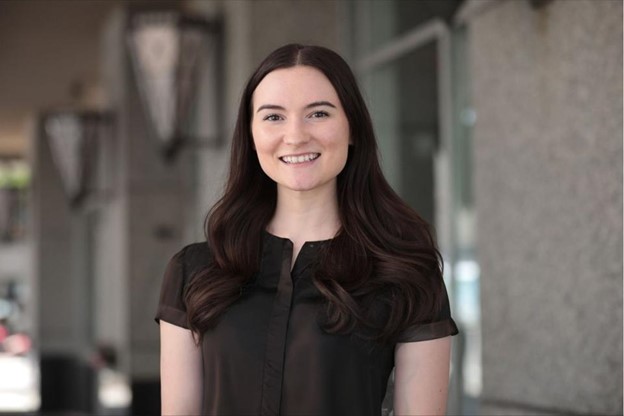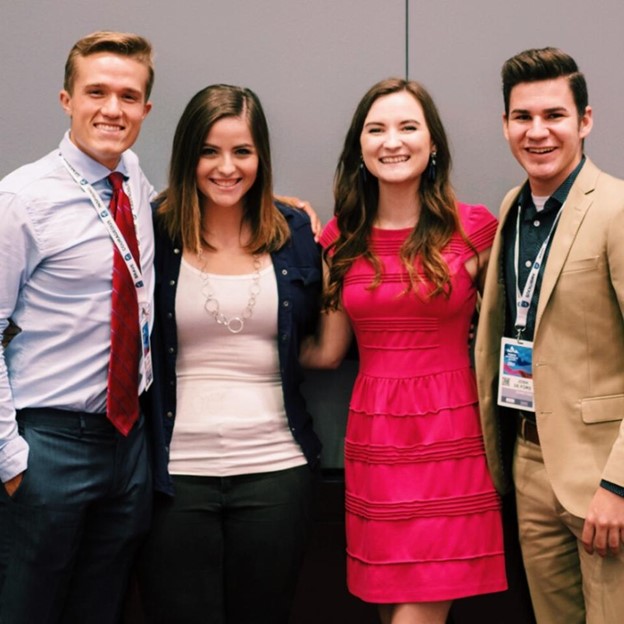Over the past year I have become increasingly interested in the work being done by conservatives to address the challenge of climate change which I discussed in this piece. In this course of this work I learned about the Conservative Climate Caucus whose Founder and former Chair is Rep. John Curtis (R-UT), now running for the U.S. Senate, and past Vice Chair and current Chair is Rep. Mariannette Miller-Meeks (R-IA). A friend sent me this piece in Politico based on an interview with Rep. Curtis which included some quotes from Danielle Butcher Franz, CEO of the non-profit American Conservation Coalition (ACC). This caught my eye, and I checked out their website which states, “We Are Young Americans Leading the Action-First Climate Movement.” I was intrigued and asked around my conservative friends to see if anyone could make an introduction. Fortunately, my good buddy Eli Lehrer, Co-Founder and President of the center-right think tank, The R Street Institute, knows Danielle and made the introduction. (Here is Part 1 and Part 2 of the interview I did with him.) I had a fascinating conversation with her and asked if she’d be willing to do an interview with me and she kindly agreed. We ended up having so much to talk about that this will also be a two part interview. This is the first one.

Co-Founder and CEO of the American Conservation Coalition | DANIELLE BUTCHER FRANZ
Eccles: Danielle, thanks for taking the time to talk with me. Based on our first conversation you know I find your political evolution a fascinating one. Let’s start by talking a bit about your childhood.
Butcher Franz: Of course. I grew up in northern Minnesota and spent a lot of time outside as a child, climbing trees, skipping rocks, and picking wild berries—the idyllic outdoorsy childhood, really. Without a doubt, I was a “lake kid,” and I learned to hunt with my father and sister. We would occasionally visit National Parks out west as we took road trips to visit extended family. I never considered the politics of loving the environment; it was something I thought everyone cared about.
My family, while very politically active, was firmly left of center. I grew up listening to public talk radio on the way to school and discussing current events around the dinner table. Around age 14, I began to form my own opinions. Dinner table conversations became more like debates, as I played devil’s advocate to argue the opposite points of my family. It was around that time, in early high school, that I realized I actually subscribed to a more conservative worldview. Too afraid to “come out” as conservative with my family, I started an anonymous Twitter account to share my opinions and find a like-minded community.

Danielle (7) and her brothers Jacob (4) and Tyler (7)) at Oregon’s Secret Beach. | DANIELLE BUTCHER FRANZ
Eccles: Too funny! Plus I suspect Minnesota is not the most hospitable environment (no pun intended) to a conservative 🐥. Then what happened?
Butcher Franz: Throughout high school my activities included chamber choir, serving as captain of my school’s dance team, pageantry, and, increasingly, political activism. During my senior year, I was given the opportunity to attend the Conservative Political Action Conference or CPAC. I booked myself a plane ticket to Washington, D.C., and told my dad I was going “for work”—fingers crossed that he would write me a note to excuse me from class. Luckily, my dad raised my siblings and me to be independent and think for ourselves. As a result, he has always been supportive of my path.
As I got more active and involved in conservative politics, I couldn’t help but notice a disappointment with Republican rhetoric on the environment. It was something I felt personally, but also something I observed in my peers, who would say things like “I’m conservative except on the environment,” and “I vote left because of climate change.” While I knew the left didn’t represent our views on the environment, it was clear that the right didn’t, either.
Eccles: Interesting and telling on both sides of the aisle. So where did the idea of the ACC come from?
Butcher Franz: By 2016, I had really integrated myself into the world of conservative politics. My Twitter following had grown to over 20,000 followers, I had taken on a few internships, was given writing and speaking opportunities, and I made a lot of connections with other young conservatives trying to make a name for themselves. One of these activists was Benji Backer. A fellow Midwesterner, Benji and I became fast friends online and after meeting in person for the first time at CPAC. Benji had risen to political prominence on Fox News after his high school teacher ridiculed him for volunteering for Republican candidates and was a Tea Party-era activist ready for his next step.
In a business class at the University of Washington, he had the idea to start a political action committee (PAC) called Conservatives for Environmental Reform, or CFER, and brought me and a few others in our circle in at the outset. We soon discovered that the PAC structure wasn’t the most productive for our goals, so we founded the American Conservation Coalition as a nonprofit organization in July of 2017.

Some members of the founding team of the American Conservation Coalition. From left to right Benji Backer, Danielle Butcher Franz, Bethany Bowra (Communications) and Josh DeFord (Graphic Design) at the Western Conservative Summit in Denver, 2017. | DANIELLE BUTCHER FRANZ
Eccles: Mind if I ask you how old you were you at the time?
Butcher Franz: Let’s see; when we began this work, I was 19. At ACC’s official launch I was 20. Some of our team members were even younger, and few a bit older. It was both a blessing and curse to start something so big at such a young age. On one hand, there was so much to learn. We didn’t know what we didn’t’ know, and as a result we also didn’t know the right questions to ask. On the other hand, that disconnect with “how things work” allowed us to think outside of the box and to be driven by commitment to the mission and the inspiration we drew from each other. I think all of us look back on that period very fondly. In many ways our founding team came of age together.
Eccles: Who do you work with?
Butcher Franz: Early on, we worked within the network that our team personally held, mostly a myriad of youth conservative groups like College Republicans, Turning Point USA, Young Americans for Liberty, and more. We also integrated ourselves into the burgeoning “eco-right” movement, groups like us who were created to be the conservative answer to left-of-center environmentalism. Groups like ConservAmerica, ClearPath, Citizens for Responsible Energy Solutions, RepublicEn, and more—allies we’re proud to work with to this day. Today, we continue to work with more traditionally conservative or liberty-minded groups such as Young Republicans, America’s Future, and even the Republican National Committee.
Eccles: That’s a great collection of organizations and I know a few of them. But sounds like your work is all with organizations on the right.
Butcher Franz: Well, yes and no. It’s nuanced! We have a broad range of partners across the political spectrum. From the beginning, we’ve been committed to working across divisions to push for environmental and energy solutions. For example, we’ve worked with moderate and left-leaning groups like the National Audubon Society and Dream.Org. Our aim is to be a big tent—with the understanding that our mission is building the conservative environmental movement. Naturally, building such a movement means that yes, our primary focus is conservatives. We play a very unique role in this space. It’s our job to reach conservative audiences, bring them to the table, and give them a voice.
Eccles: Fair enough and, believe me, I’m really glad you’re doing this. But let me push you again. Why did conservatives lose the drift on climate change? What happened here in your camp?
Butcher Franz: Historically, environmental protection has been a very bipartisan issue area. Throughout recent history, though, we’ve seen “climate change” become the environmental issue, and the Left has dominated the conversation and taken hold of the narrative. Instead of countering liberal environmental solutions with conservative environmental solutions, conservatives shut down everything liberals were for in regard to the environment. The environment has quite unfortunately become a bit of a culture-war issue, and it’s important to walk back from that ledge and for conservatives to recognize that we have unique, effective solutions to offer.
Eccles: I couldn’t agree with you more on needing to get away from climate as a culture war to climate change as something where we need the best ideas regardless of party affiliation. But, as you say, the Left is really dominating the narrative.

ACC team touring Midland, Texas in October 2022 | DANIELLE BUTCHER FRANZ
Butcher Franz: True and the ACC was founded to quite literally “change the narrative,” and show that even if we don’t like what the Left is proposing, that doesn’t mean we can’t come to the table with our own ideas. It’s been part of our work to show conservative leaders that engaging on environmental issues doesn’t mean alienating the conservative base, nor does it mean making economic sacrifices in favor of environmental protection. It’s important that we let our smart, actionable solutions speak for themselves, and lead in a way that allows for economic prosperity and environmental success.
When we talk about environmentalism in a localized, actionable way, the American people immediately have buy-in, no matter if they’re Republican or Democratic. Everyone wants clean air, clean water, and healthy communities in which to raise their families.
Eccles: Makes sense but, if you’ll forgive another liberal perspective, seems like most conservatives aren’t all that concerned about climate change. True or not?
Butcher Franz: There are, of course, some who have that knee-jerk reaction of “no” because of the media they’ve consumed or the narrative they’ve been given. But, if you actually have a conversation about environmental issues and what’s happening on the ground in their communities, there is a lot of bridge-building that can happen. That’s a lot of the work that ACC does through our field program, reaching young people who are right-of-center but want to be equipped with the tools to engage on the environmental issues they care about.
Eccles: Which takes us back to the issue of language and narrative. I’ve looked into that a bit myself, as you, thanks to that great report by the Center for Social and Environmental Futures about polarization around climate change, which I wrote about here. So please explain to me just what it is that conservatives don’t like about the Left’s approach to climate change?
Butcher Franz: Environmentalists have in many ways done themselves a disservice with the Right. Stereotypically, many conservatives have this view of climate activists as young people with blue hair stopping traffic and throwing soup on priceless artwork. Really, that comes down to a PR and perception problem. Conservatives don’t want to be associated with those archetypes.
When it comes to policy, conservatives are skeptical of the Green New Deal or other sweeping climate proposals because they often see these proposals as a Trojan Horse for more government and progressive ideals. And to be fair, we’ve seen this in action. After all, the Green New Deal resolution “originally wasn’t a climate thing,” according to Rep. Alexandria Ocasio Cortez’s former chief of staff Saikat Chakrabarti.Eccles: Oh, that’s interesting. I didn’t know that. What was it originally?
Butcher Franz: In the words of Chakrabarti, The interesting thing about the Green New Deal, is it wasn’t originally a climate thing at all, “ rather “it was more of a “how-do-you-change-the-entire-economy-thing.” As you can imagine, it’s hard for the right to engage in good faith when fears like this are confirmed.

Danielle (9) with her cousin Whitney’s horse Jack in Cheyenne, Wyoming | DANIELLE BUTCHER FRANZ
Eccles: Hey, thanks for the tutorial from a conservative about a liberal to another liberal! But it must be a lot more than AOC and her Green New Deal that conservatives don’t like so please elaborate on that.
Butcher Franz: What frustrates me about the mainstream environmental movement is the hypocrisy that we often see from its leaders. For instance, we’re told that we need to divest from fossil fuels and pursue 100% clean energy for net-zero emissions, yet environmental groups routinely oppose clean nuclear power, permitting reform that would make it easier to build clean energy projects in America, and domestically mining for the minerals we need to deploy more of these technologies.
Climate-conscious conservatives, conversely, are in favor of nuclear energy, permitting reform, and American energy dominance generally as we transition to clean energy. We know that we need an all-of-the-above approach, and taking real solutions off the table isn’t an option. We should pursue policy opportunities that allow America to maintain a competitive edge while reducing emissions. We want to see the power of market forces in action when it comes to energy and environmental issues.
Anti-humanist rhetoric is also growing in popularity, which is very concerning and off-putting. Don’t have kids, don’t have pets, don’t eat meat, don’t travel. We need an environmental approach that acknowledges humans can prosper and ecosystems can thrive at the same time.
Eccles: Well, if it’s any small comfort I’m a liberal who agrees with everything you’re saying here. In fact, I’ve written about these topics with my good friend (Libertarian 😱) John Skjervem, the CIO of the Utah Retirement Systems. But I’m afraid we’re both out of time and haven’t even gotten to really talking about the ACC. Let’s set up another time to do that.
Butcher Franz: Happy to, Bob, and looking forward to our next conversation.
SUBSCRIBE TO OUR NEWSLETTER
Subscribe our newsletter to receive the latest news, articles and exclusive podcasts every week

